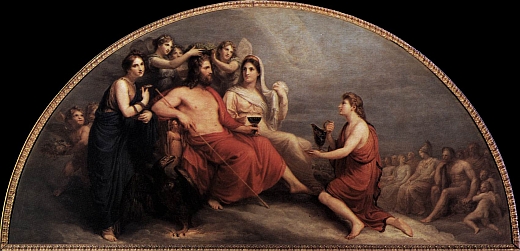
“Bei dem traurigen Anblick nicht sowohl der Übel, die das menschliche Geschlecht
aus Naturursachen drücken, als vielmehr derjenigen, welche die Menschen sich
untereinander selbst anthun, erheitert sich doch das Gemüth durch die Aussicht,
es könne künftighin besser werden; und zwar mit uneigennützigem Wohlwollen,
wenn wir längst im Grabe sein und die Früchte, die wir zum Teil selbst gesät haben,
nicht einernten werden.”
Nie las ein Blick, von Thränen übermannt,
ein Wort wie dieses von Immanuel Kant.
Bei Gott, kein Trost des Himmels übertrifft
die heilige Hoffnung dieser Grabesschrift.
Dies Grab ist ein erhabener Verzicht:
“Mir wird es finster, und es werde Licht!”
Für alles Werden, das am Menschsein krankt,
stirbt der Unsterbliche. Er glaubt und dankt.
Ihm hellt den Abschied von dem dunklen Tag,
daß dir noch einst die Sonne scheinen mag.
Durchs Höllentor des Heute und Hienieden
vertrauend träumt er hin zum ewigen Frieden.
Er sagt es, und die Welt ist wieder wahr,
und Gottes Herz erschließt sich mit “und zwar”.
Urkundlich wird es; nimmt der Glaube Teil,
so widerfährt euch das verheißne Heil.
O rettet aus dem Unheil euch zum Geist,
der euch aus euch die guten Wege weist!
Welch eine Menschheit! Welch ein hehrer Hirt!
Weh dem, den der Entsager nicht beirrt!
Weh, wenn im deutschen Wahn die Welt verschlief
das letzte deutsche Wunder, das sie rief!
Bis an die Sterne reichte einst ein Zwerg.
Sein irdisch Reich war nur ein Königsberg.
Doch über jedes Königs Burg und Wahn
schritt eines Weltalls treuer Untertan.
Sein Wort gebietet über Schwert und Macht
und seine Bürgschaft löst aus Schuld und Nacht.
Und seines Herzens heiliger Morgenröte
Blutschande weicht: daß Mensch den Menschen töte.
Im Weltbrand bleibt das Wort ihr eingebrannt:
Zum ewigen Frieden von Immanuel Kant!
“In the sad contemplation not just of the evils which bear upon the human species by force of nature, but much more of those which humans do to one another, the spirit is nevertheless cheered by the prospect that it might become better in the future; and indeed with selfless goodwill, for we will be long in the grave before the opportunity arises to harvest any of the fruits which we in part may have sown.”
Overwhelmed by tears, but never before glanced,
Such words as these by Immanuel Kant.
By God, no comfort of the heavens surmounts
The divine hope of this memorial.
This grave is a sublime renunciation
“It grows dark about me, let there be light!”
For all the possibilities that depreciate human life,
The immortal dies. He believes and thanks.
The farewell from a darkening day lights the horizon
So that the sun may shine for you again.
Through the gates of Hell of today and beyond
He dreams trusting in a perpetual peace.
He says it and the world is true again
And God’s heart opens up again with “and yet…”
It is documented, share the faith
So the promised salvation will come to you.
Oh save yourself from the calamity, hasten to the
Spirit that will bring you through yourself to the proper course.
Oh what humanity! What a sublime shepherd!
Woe to him who does not divert the failure.
Woe, when in the world falls into a German stupor,
The last German wonder that she summons!
To the stars reached once a dwarf
His earthly realm was merely Königsberg.
Yet over every king’s fortress and mania
Strode the universe’s most devoted servant.
His word commands sword and might
And his pledge frees us from sin and night.
And the holy dawn of his heart
Stays the incest: that one man kill another.
In the world’s flames may this phrase be seared:
Towards a Perpetual Peace by Immanuel Kant.
—Karl Kraus, Zum ewigen Frieden von Immanuel Kant (1920) first published in Ausgewählte Gedichte, pp. 70-71 (S.H. transl.)


